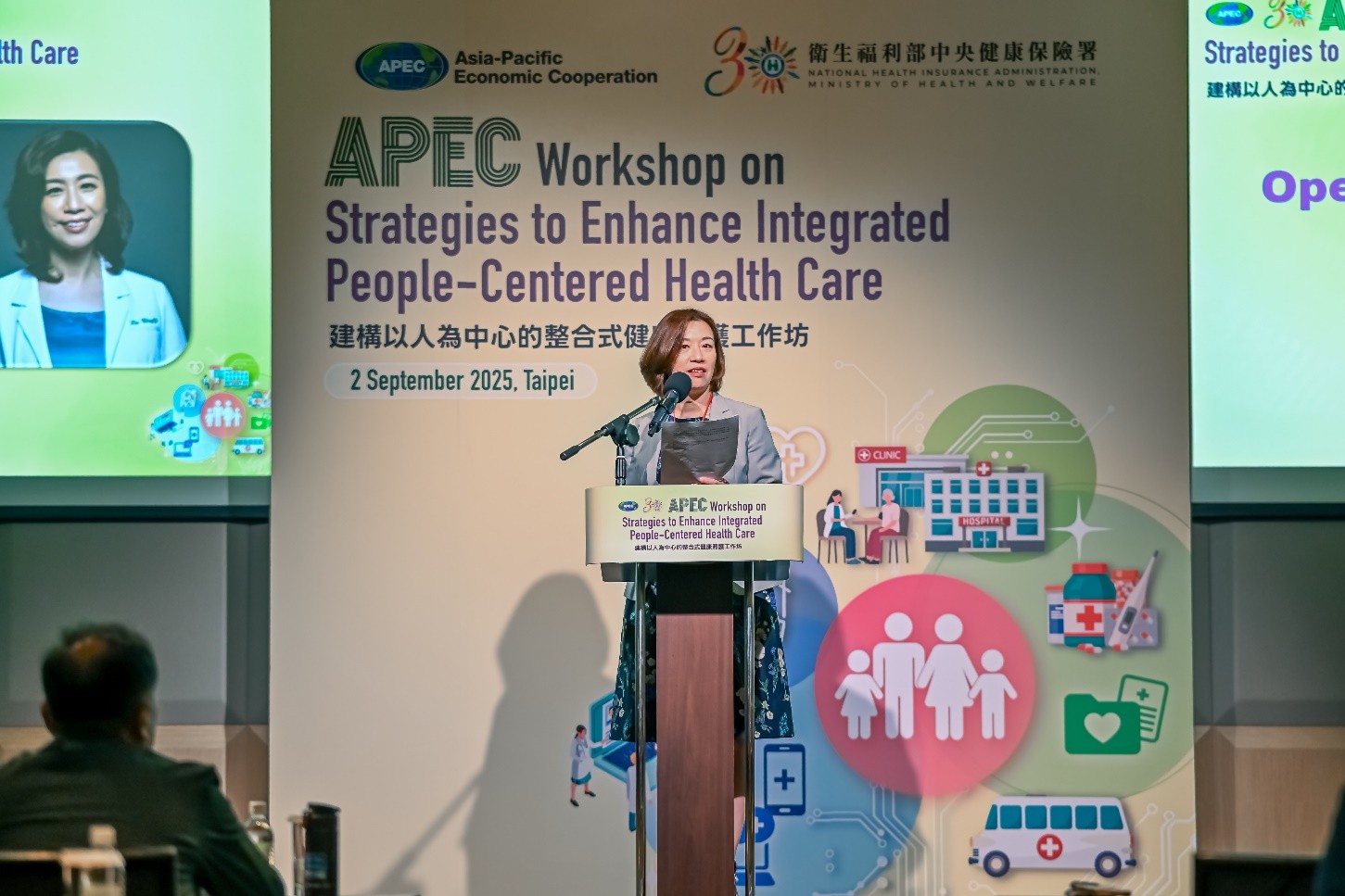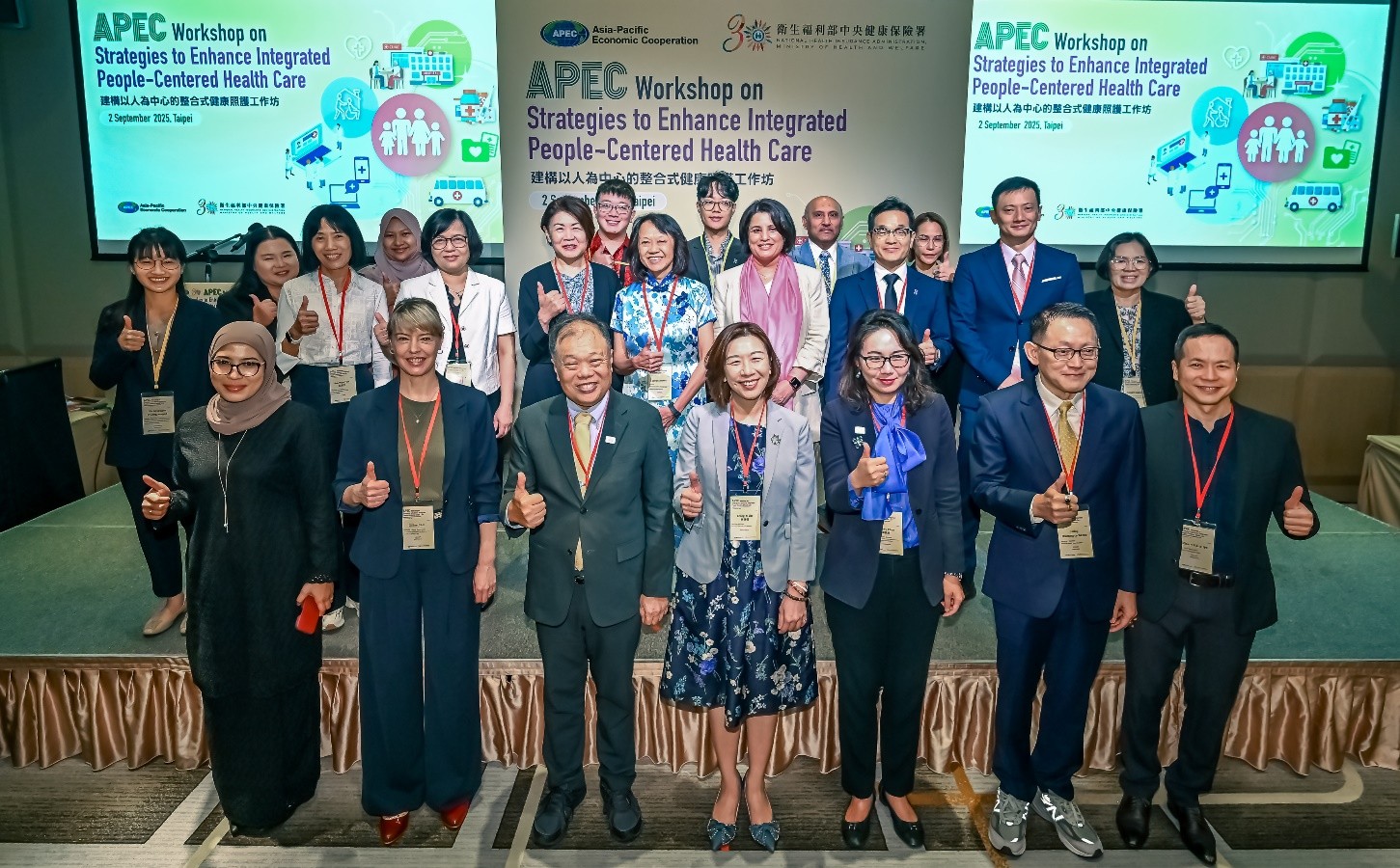On September 2, 2025, the National Health Insurance Administration (NHIA), Ministry of Health and Welfare, hosted the APEC Workshop on Strategies to Enhance Integrated People-Centered Health Care at the Taipei Marriott Hotel. Representatives from eight APEC member economies—including Australia, Canada, Japan, Korea, Malaysia, Singapore, Thailand, and Viet Nam—gathered to exchange experiences and best practices. Discussions focused on three key themes: (1) Best Practices in Governance, Accountability, and Frameworks to Support Integrated People-Centered Healthcare; (2) Empowerment in Healthcare: Using Digital Technologies to Enhance Integrated Care Services and Reduce Health Inequities; and (3) Effective Integrated Healthcare Models through Community Engagement, Cross-Departmental Cooperation, and Quality Improvement. Participants shared valuable insights as well as the challenges they have faced in advancing integrated care.
In her opening remarks, Deputy Minister of Health and Welfare, Dr. Ching-Yi Lin, emphasized that rapid population aging and the rising prevalence of chronic diseases have significantly increased healthcare expenditures, posing challenges to the national health system. He stressed that developing integrated, people-centered healthcare models is a key policy priority, ensuring fair, personalized, and team-based services. NHIA has long promoted such approaches and, in response to technological advancements, has established a personalized primary care information integration platform. This system not only enhances accessibility to comprehensive care but also optimizes the overall healthcare environment and reduces burdens on medical professionals. Deputy Minister Lin expressed her hope that the workshop would strengthen exchanges and collaboration among APEC economies to build more resilient healthcare systems.
Improving population health is NHIA's core mission, with enhancing healthcare accessibility being a key step toward achieving Universal Health Coverage (UHC). To respond to emerging health challenges, NHIA has in recent years introduced several integrated care programs. One notable example is the Family Physician Integrated Care Program, which offers patients with chronic conditions continuous and comprehensive services. To reduce health disparities between urban and rural regions, NHIA has also implemented the Integrated Holistic Health Care Program for Rural Areas, encouraging healthcare institutions to form interdisciplinary care teams that provide services such as health promotion, preventive care, disease treatment, case tracking, and health management. By integrating digital technologies and telemedicine, healthcare access in remote and outlying island areas has been significantly improved, advancing the goal of health equity.
As part of this year's program, on September 3, delegates from participating economies will visit the Industrial Technology Research Institute (ITRI) and the RICARE Day Care Center to gain first-hand insights into how digital innovation and integrated care models are being applied in Chinese Taipei's healthcare system.
In recent years, NHIA has continuously hosted APEC-related workshops, which have become valuable platforms for dialogue and collaboration among APEC economies, further strengthening engagement within the APEC framework while enhancing contributions to global health development.

Photo 1. Dr. Ching-Yi Lin, the Deputy Minister of Health & Welfare, gave the opening remarks at the APEC Workshop on Strategies to Enhance Integrated People-Centered Health Care on September 2, 2025.

Photo 2. Group photo with Deputy Minister Ching-Yi Lin (4th from right), Deputy Director General of the NHIA I-Ming Parng (3rd from left), Deputy Director General Lian-Yu Chen (3rd from right), Dr. Jadej Thammatacharee, Secretary-General of Thailand's National Health Security Office (2nd from right), Ms. Aisyah, Deputy Director of the Malaysian Friendship and Trade Center (1st from left), and representatives from eight APEC economies

